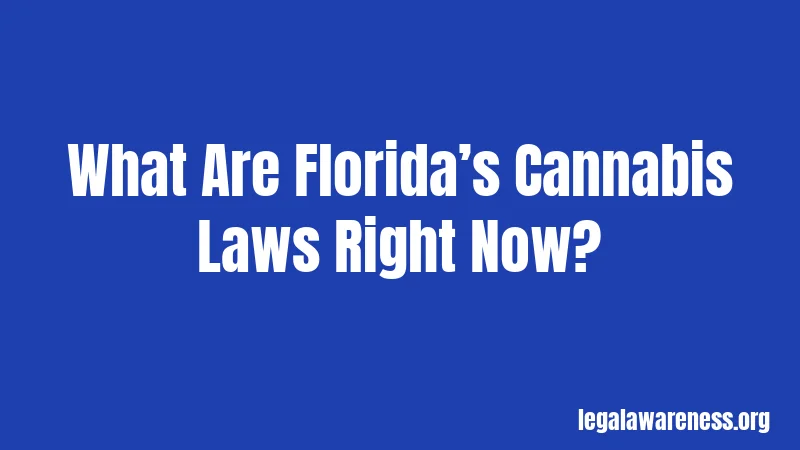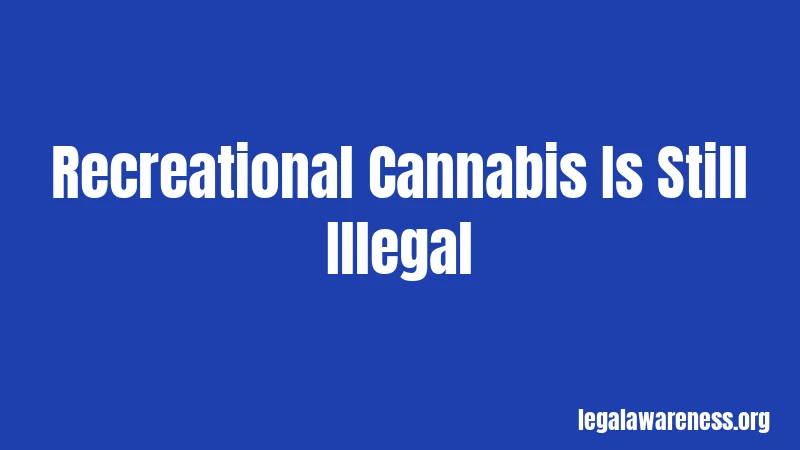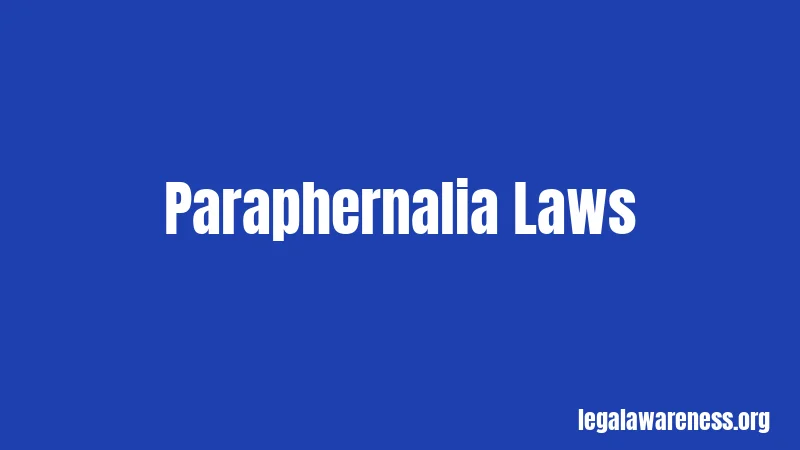Cannabis Laws in Florida (2026): Your Complete Survival Guide
Here’s the thing about Florida and weed. It’s complicated.
Most people visiting from other states have no clue how strict things are here. They bring their legal cannabis across state lines. Big mistake. Even medical marijuana from another state won’t protect you in Florida.
Let’s break down exactly what’s legal, what’s not, and what happens if you get caught.
What Are Florida’s Cannabis Laws Right Now?

Medical marijuana is legal in Florida. Recreational use? Still completely illegal.
You’re gonna love this one. In November 2024, 56% of Florida voters said yes to legalizing recreational cannabis. Sounds like it should’ve passed, right? Wrong. Florida requires 60% approval for constitutional amendments. So despite majority support, nothing changed.
Now there’s a new push for the 2026 ballot. More on that later.
Medical Marijuana in Florida
Florida allows medical marijuana for people with qualifying conditions. You need a medical marijuana card from the state. Not from Colorado. Not from California. From Florida.
Here’s what you need to qualify:
You must be a Florida resident or seasonal resident. Seasonal residents need to live in Florida for at least 31 consecutive days each year. You also need a diagnosed qualifying condition from a state-certified physician.
Qualifying Medical Conditions
The state lists specific conditions that automatically qualify you. These include cancer, epilepsy, glaucoma, HIV/AIDS, PTSD, ALS, Crohn’s disease, Parkinson’s disease, and multiple sclerosis.
Chronic pain is probably the most common reason people get cards. But it has to be nonmalignant chronic pain caused by a qualifying condition.
Hold on, this part is important. Florida doctors can also recommend medical marijuana for conditions “comparable” to the listed ones. This gives physicians some wiggle room. Conditions like severe arthritis, fibromyalgia, anxiety, and migraines sometimes qualify under this provision.
Terminal conditions diagnosed by two physicians also qualify. For minors under 18, two doctors must recommend treatment. Parents or legal guardians must consent and register as caregivers.
How Much Can Medical Patients Possess?
Smokable flower: 2.5 ounces every 35 days. You can possess up to 4 ounces at any time.
Other forms have different limits. Edibles max out at 60 mg of THC daily. Vaporized products allow 350 mg of THC daily. Your doctor determines your specific limits based on your treatment plan.
Where Can You Buy Medical Marijuana?
Only from state-licensed Medical Marijuana Treatment Centers. These are the only legal dispensaries in Florida. Trulieve, Curaleaf, Surterra Wellness, and others operate throughout the state.
As of 2025, Florida has around 716 open dispensary locations. Not bad for a medical-only state.
Recreational Cannabis Is Still Illegal

Let’s be crystal clear. Possessing any amount of cannabis without a medical card is illegal in Florida. Period.
Wondering if this applies to you? Yes. It does.
Possession Penalties
Florida doesn’t mess around with marijuana charges. The penalties hit hard and fast.
20 grams or less: First-degree misdemeanor. Up to one year in jail. Up to $1,000 in fines. Plus, your driver’s license gets suspended for at least six months. Even for a first offense.
Think of it like a traffic ticket, but way more serious.
More than 20 grams: Third-degree felony. Up to five years in prison. Up to $5,000 in fines.
25 pounds to 2,000 pounds: Second-degree felony. Mandatory minimum three years in prison. Up to 15 years maximum. Fines up to $25,000.
2,000 pounds to 10,000 pounds: First-degree felony. Mandatory minimum seven years. Up to 30 years in prison. Fines up to $50,000.
10,000 pounds or more: First-degree felony. Mandatory minimum 15 years. Up to 30 years maximum. Fines up to $200,000.
These aren’t suggestions. Judges must impose mandatory minimum sentences when they apply.
What About Hash and Concentrates?
Possession of hashish or concentrates is automatically a felony. Even for personal use. Up to five years in prison. Up to $5,000 in fines.
So that THC vape pen from Colorado? Felony in Florida. Those edibles from California? Felony. That dab rig? Felony.
Yep, that’s all you need to know about concentrates.
Location Matters More Than You Think
Getting caught near certain places makes things worse. A lot worse.
Possession within 1,000 feet of schools, colleges, parks, churches, or childcare facilities triggers enhanced penalties. Even if you’re under 20 grams, you could face felony charges.
Sale or delivery near these protected areas is a felony. Mandatory minimum three years in prison. Up to 15 years maximum. Fines up to $10,000.
Florida takes this seriously. Measure the distance if you’re anywhere near these places.
Growing Cannabis Is Illegal
You cannot grow marijuana at home in Florida. Not even medical patients.
Cultivating 25 plants or less: Up to five years in prison. Up to $5,000 in fines.
Cultivating more than 25 plants: Up to 15 years in prison.
If a minor lives where you’re growing? The maximum sentence jumps to 30 years.
Only state-licensed cultivators can grow marijuana legally. Don’t try this at home.
Paraphernalia Laws

Possessing drug paraphernalia is a misdemeanor. Up to one year in jail. Up to $1,000 in fines.
This includes pipes, bongs, grinders, rolling papers marketed for marijuana use, and vaporizers designed for cannabis.
Advertising the sale of marijuana paraphernalia is also illegal. First-degree misdemeanor with the same penalties.
Driving and Cannabis Don’t Mix
Driving under the influence of marijuana is illegal. Even for medical marijuana patients.
Officers are trained to detect cannabis impairment. They use field sobriety tests and may request chemical testing.
First DUI offense: Fines from $500 to $1,000. License suspension for at least 180 days. Possible jail time.
DUI causing serious bodily injury: Minimum five years in prison. Fines up to $5,000.
DUI causing death: Minimum 15 years in prison.
Here’s the deal. If you’re a medical patient and an officer asks if you’ve used cannabis before driving, be careful. Admitting you smoked legally obtained medical marijuana before getting in the car triggers a DUI investigation.
Some Cities Have Decriminalization Programs
Wait, it gets better. Sort of.
Some Florida counties and cities have civil citation programs. Instead of arresting you for possessing under 20 grams, officers can issue a citation with a fine or community service requirement.
The following areas have decriminalization policies:
- Miami-Dade County (up to $100 fine)
- Broward County
- Tampa
- Orlando
- Palm Beach County
- Key West
- Hallandale Beach
- Volusia County
Okay, pause. Read this carefully.
These are local programs. They don’t override state law. Officers still have full discretion to arrest you and charge you under Florida statutes. You cannot count on getting a citation instead of criminal charges.
The officer decides. Not you.
Out-of-State Medical Cards Don’t Work
Most people don’t realize how strict Florida is about this. Florida does not recognize medical marijuana cards from other states. Zero reciprocity.
Your Colorado medical card? Useless here. Your California prescription? Doesn’t matter. Your Michigan authorization? Won’t protect you.
Tourists from legal states face the same penalties as Florida residents. That vacation to Miami Beach can turn into a criminal case real fast.
Honestly, this is the part most people miss.
What About CBD?
Low-THC cannabis products are legal in some circumstances. These are cannabis extracts high in CBD and low in THC.
The 2018 Farm Bill legalized hemp-derived CBD products containing less than 0.3% THC at the federal level. These products are available in Florida without a prescription.
But here’s where it gets tricky. Higher-THC CBD products require a medical marijuana card.
Employment and Medical Marijuana
Having a medical marijuana card doesn’t guarantee job protection. Federal law prohibits marijuana use. This creates problems.
The Americans with Disabilities Act doesn’t protect medical cannabis patients. Florida hasn’t enacted state-level employment protections for most medical marijuana users.
Law enforcement officers can’t use medical marijuana at all. Some bills proposed protections for firefighters and EMS workers in 2025, but they didn’t pass.
If you work for the federal government or a company with federal contracts, medical marijuana use could cost you your job. Drug tests don’t care if you have a card.
The 2026 Legalization Effort
Now, here’s where things get interesting.
Smart & Safe Florida filed a new constitutional amendment for the 2026 ballot. This is their second attempt after falling short in 2024.
The new proposal addresses criticisms from the previous version. Adults 21 and older could possess up to two ounces of marijuana. That’s one ounce less than the 2024 proposal.
The amendment requires the legislature to create licenses for non-medical marijuana businesses. This would break up Florida’s current “vertical integration” model where medical companies handle everything from growing to selling.
It also includes stricter packaging rules and a public smoking ban.
As of November 2025, the campaign submitted over 612,000 verified signatures. They need 880,062 total verified signatures to get on the ballot. The Florida Supreme Court must also approve the ballot language.
Governor Ron DeSantis opposed the 2024 measure. He argued the previous proposal would cement Trulieve’s monopoly on the cannabis market. The new version tries to address these concerns.
Will it pass? That’s the big question.
Recent Law Changes You Should Know
In July 2025, Florida passed Senate Bill 2514. This law requires the Office of Medical Marijuana Use to revoke medical marijuana cards from patients convicted of certain drug offenses.
If you’re convicted of trafficking, selling, manufacturing, or delivering controlled substances on or after July 1, 2025, you lose your card. Possession with intent to sell also triggers revocation.
Growing your own cannabis or distributing it means losing your medical card. No exceptions.
The 2025 legislative session ended in June with zero cannabis reforms passing. Bills to legalize recreational use didn’t even get committee hearings. Proposed improvements to the medical program went nowhere.
How to Get a Medical Marijuana Card
Ready to apply? Here’s the step-by-step process.
Step 1: Find a certified physician. Only doctors who completed Florida’s required training can recommend medical marijuana. The Office of Medical Marijuana Use maintains a list of qualified physicians.
Step 2: Get diagnosed. Your doctor must confirm you have a qualifying medical condition. They determine if medical marijuana is appropriate for you.
Step 3: Register with the state. Your physician enters your information into the Medical Marijuana Use Registry. You receive login credentials by mail.
Step 4: Apply for your card. Submit your registry ID application online or by paper. Online applications take about two weeks to process. Paper applications take longer.
Step 5: Pay the fee. The application costs $75.
Step 6: Receive your card. Once approved, you can contact licensed dispensaries and fill orders placed by your physician.
Cards must be renewed annually. You can start the renewal process 45 days before your card expires.
What Happens If You Get Arrested?
First, shut up. Seriously.
You have the right to remain silent. Use it. Don’t explain. Don’t make excuses. Don’t consent to searches.
Call a lawyer immediately. Criminal defense attorneys know how to challenge marijuana charges.
Common defenses include:
- Unlawful search and seizure
- Lack of knowledge of the substance
- Lack of possession or control
- Entrapment by law enforcement
- Chain of custody issues
- Improper lab testing
Even misdemeanor marijuana charges create a permanent criminal record. This affects employment, housing, professional licensing, and educational opportunities.
For students, professionals, and non-citizens, the consequences can be life-altering. A conviction can mean losing financial aid, professional licenses, or immigration status.
Don’t try to handle this alone.
What About Expungement?
Cannabis prohibition has given tens of thousands of Floridians criminal records. These records block economic opportunities, housing, and professional licensing.
Senator Tracie Davis proposed two expungement bills in 2025. Senate Bill 1026 would have expunged charges for possession of two ounces or less. Senate Bill 1028 would have created a comprehensive framework for cannabis expungements.
Neither bill got a committee hearing. The legislature refused to address the issue.
This means if you have a marijuana conviction on your record, you’re stuck with it for now. The only relief comes from individual petitions for expungement, which require legal help and have no guarantees.
Tips for Staying Legal
Listen, the safest approach is simple. Don’t possess marijuana in Florida unless you have a valid Florida medical card.
If you’re a medical patient:
- Keep your card current and with you
- Store cannabis in original packaging
- Never drive under the influence
- Don’t use in public places
- Stay within your possession limits
- Only buy from licensed dispensaries
If you’re visiting from another state:
- Don’t bring cannabis across state lines
- Don’t assume your home state’s laws apply here
- Don’t risk it for a vacation
Sound complicated? It’s actually not. Just follow the rules.
The Bottom Line
Florida has some of the strictest cannabis laws in the country. Medical use is legal for qualified patients. Everything else is criminal.
Possession of any amount without a card is illegal. More than 20 grams is a felony. Concentrates and edibles are felonies. Growing is a felony. Out-of-state cards don’t work.
The 2026 ballot initiative might change things. But that’s still a maybe. For now, the law is clear.
You’re not alone, this confuses a lot of people. But confusion doesn’t protect you in court.
Frequently Asked Questions
Is recreational marijuana legal in Florida in 2026? No. The 2024 legalization amendment failed to reach the required 60% threshold. Recreational use remains illegal.
Can I use my out-of-state medical marijuana card in Florida? No. Florida does not recognize medical marijuana cards from other states. Only patients registered in Florida’s Medical Marijuana Use Registry are protected.
What happens if I’m caught with less than 20 grams? You face a first-degree misdemeanor charge. Penalties include up to one year in jail, up to $1,000 in fines, and mandatory driver’s license suspension for at least six months.
Are THC vapes and edibles legal in Florida? Only for medical marijuana patients with valid Florida cards. Possession of THC concentrates without a card is an automatic felony, even for personal use.
Can medical marijuana patients grow their own cannabis? No. Home cultivation is illegal in Florida, even for medical patients. Only state-licensed cultivators can legally grow marijuana.
What are the qualifying conditions for medical marijuana? Cancer, epilepsy, glaucoma, HIV/AIDS, PTSD, ALS, Crohn’s disease, Parkinson’s disease, multiple sclerosis, terminal conditions, and chronic nonmalignant pain. Doctors can also certify patients with comparable conditions.
How much can medical patients possess? Smokable flower: 2.5 ounces every 35 days, with a maximum of 4 ounces at any time. Other forms have different limits based on doctor’s orders.
Can tourists be arrested for small amounts? Absolutely. Out-of-state visitors face the same penalties as Florida residents. What’s legal at home may not be legal here.
Does decriminalization apply statewide? No. Only certain counties and cities have civil citation programs. These don’t override state law, and officers still have discretion to arrest you.
Will the 2026 ballot initiative pass? Unknown. The campaign needs over 880,000 verified signatures and Supreme Court approval just to get on the ballot. Then it needs 60% voter approval to pass.
Final Thoughts
Now you know the basics. Florida’s cannabis laws are strict, confusing, and unforgiving.
Medical marijuana is legal if you jump through all the hoops. Recreational use lands you in jail. Simple as that.
The 2026 initiative gives Florida another shot at legalization. Until then, play it safe.
Stay informed, stay safe, and when in doubt, look it up or ask a lawyer. A criminal record isn’t worth the risk.
References
- Florida Statutes Section 381.986 – Medical Marijuana Use https://www.leg.state.fl.us/statutes/index.cfm?App_mode=Display_Statute&URL=0300-0399/0381/Sections/0381.986.html
- Office of Medical Marijuana Use – Florida Department of Health https://knowthefactsmmj.com/
- NORML – Florida Laws and Penalties https://norml.org/laws/florida-penalties/
- Marijuana Policy Project – Florida https://www.mpp.org/states/florida/
- Ballotpedia – Florida Marijuana Legalization Initiative (2026) https://ballotpedia.org/Florida_Marijuana_Legalization_Initiative_(2026)
- Florida Division of Elections – Initiative 25-01 https://dos.myflorida.com/elections/
- Florida House of Representatives – HB 1501 (2025) https://www.flhouse.gov/Sections/Bills/billsdetail.aspx?BillId=82256
